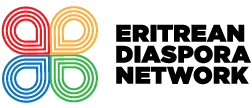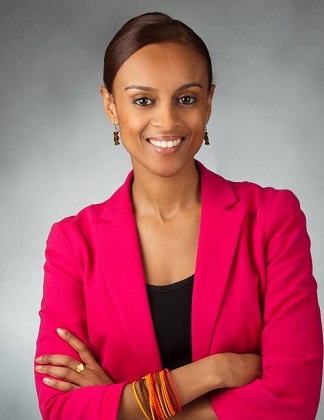This month’s professional spotlight features Semhar Araia. Semhar currently serves as the Managing Director for Diaspora and Multicultural Partnerships at UNICEF, but has extensive experience serving diaspora communities across many facets. Semhar is a social activist, professor, international lawyer, and founder of Diaspora African Women’s Network and Semai Consulting. Learn more about Semhar, her impressive career, and commitment to diaspora communities:
Could you briefly explain some of your responsibilities in your current career role?
Last year, I joined UNICEF USA to serve as their Managing Director for Diaspora and Multicultural Partnerships. UNICEF USA is a non-profit organization responsible for fundraising and raising awareness on behalf of UNICEF in the United States. UNICEF works in 190 countries, including Eritrea, helping to provide humanitarian assistance and promote sustainable development for the most vulnerable children. UNICEF’s programs include direct interventions such as clean water, immunizations, maternal and child health, gender equality, education, early childhood development, and much more.
Much of my work is focused on working with diaspora communities. I get to help build meaningful, long-term partnerships with diaspora organizations in the United States who want to support UNICEF. We know that many of us in the diaspora often want to help our communities back home, but don’t know how to help or how to partner with other groups. With UNICEF USA, we are inviting diaspora communities to channel their energy, support and resources into programming that is having a direct impact and making a difference on the ground, in a country or on a theme they care about. It’s also important to remember that most of the time, this programming is done and led by local national staff who have dedicated their life to helping others in need. For diasporas, these are important factors that I get to focus on at work every day.
How did you come to decide that this was the right career path for you?
While I’ve had a non-traditional career path, I think the common thread is that I’ve always focused on helping immigrant and diaspora communities like ours mobilize, organize and participate in international issues. Growing up in America and being raised in a family that closely followed and supported the struggle for Eritrea’s independence, taught me the importance of being actively engaged, of service, and of learning. I learned that we can feel so connected yet disconnected as members of the diaspora, but we need to take that energy and put it into daily, meaningful practice – both here and abroad.
Is there a philosophy that drives your career?
There are two main philosophies I hold very near and dear to my heart, which drive and shape much of my outlook on life and work. First, I believe in the Golden Rule: treat others how you want to be treated. It’s the basis for everything else in life. The words and language we use, to ourselves and to others, speaks volumes about how we see ourselves.
Secondly, I believe that you must #CreateTheSpaces you wish existed, not necessarily in an entrepreneurial sense, but in terms of your life and the community you want to be a part of. You have to embody and cultivate the type of community and space you wish existed. If you see it’s missing, then help create it. Build with others, fill in what’s missing, and make a system better. You have so much to offer.
What do you consider to be your greatest professional accomplishment?
Hmm. That’s hard to say. I feel proud of my work when my family feels proud. And so far, they are happy. That’s probably the main goal for me. Not accomplishments. This is mission-driven work. So it’s a constant, personally driven target and the goal is to have consistent moments of progress and growth towards my mission.
What’s one piece of advice you would give someone looking to transition into your line of work?
Working with diaspora communities requires you engage from a place of service, purpose and direction. It isn’t about getting the right degree or becoming an expert on diasporas or the issues. The goal and minimum expectation is to do this work as professionally, authentically, purposefully and humbly as you can. That means you should interrogate your motivations, desires and expectations before you put yourself out there. It means you should aim to have a clear mind, open heart, and sense of self that is open to learning and engagement. Our communities deserve your best self that is open to feedback, learning and criticism. It all comes with the territory.
You are collaborating with EDN on a 3 Part Seminar on Leadership. Why do you think it’s important to develop leadership skills? What can one gain?
I think it’s important because having those skills will prepare you for what’s inevitable in life: conflict, challenges, blessings and opportunities. Being a “leader” isn’t about having a title or status. It’s about how you apply yourself in those moments.
Leadership starts when you are able to locate yourself and assess who you are. Truthfully. It’s hard, but it’s about being open and ready for what’s ahead. The leadership workshops will help you assess your skills and abilities as a leader, in the community, in the workplace and most importantly, in your own life.
Outside of all of your hard work and efforts toward building your brand, what do you do for fun? Hobbies?
Well I love what I do, so all of this feels like fun. It’s a wondrous, fun journey and I love to learn. But honestly, my brother Fnan can answer this question much better than I can. He knows I find a lot of fun in the silly and strange things. Let’s just say, I definitely have my own sense of humor.
I also love to cook and love to travel domestically as well as internationally.My first international trip was to Eritrea when I was 14. I naively thought I would know Eritrea, simply because I grew up in an Eritrean household. But I was wrong. I learned I had so much more to learn about Eritrea and the rest of the world. That trip taught me I love learning about different lives.
Being a traveler means you are constantly learning! Whether it’s here or abroad, you have to figure out the bus system, learn the best route, be exposed to a new culture, watch how kids play, and watch how the city works. Travel is about the journey as a whole for me. It stretches you and helps you locate yourself. It forces you to accept your shortcomings because you’re constantly learning. That to me is fun, believe it or not. See what I mean about being strange?
Don’t miss your chance to learn about leadership building first hand from Semhar during our upcoming Introduction to Leadership Seminar in Washington, DC.


Dear Editor,
I have known Semhar Araia through all of her career, and I get mesmerized each time she leaps forward to higher grounds. Semhar Araia is not an average person in my opinion. She will do eight things simultaneously and still focus on each of her activities with intense follow up. With each of the steps she takes, I believe the Diaspora community learns to focus on what matters and learns to deal with the challenges that come up with being a first immigrant. Most importantly though, Semhar Araia educates the young Diaspora; specially women to address the generational gaps, and how one can deal with the upcoming and present challenges.
What humbles most about Semhar Araia is, she doesn’t even talk about or glorify her achievements. The Eritrean Diaspora has to invite such powerful person, who is down to earth to educate and perhaps save and/or prevent any social shortcomings we face.
I strongly believe, if the Eritrean Diaspora brings ten of Semhar Araia, then the world would be a much better place to live in.
Sincerely,
Araia G. Ephrm
eNovation Inc, Founder/CEO
Oakland, California